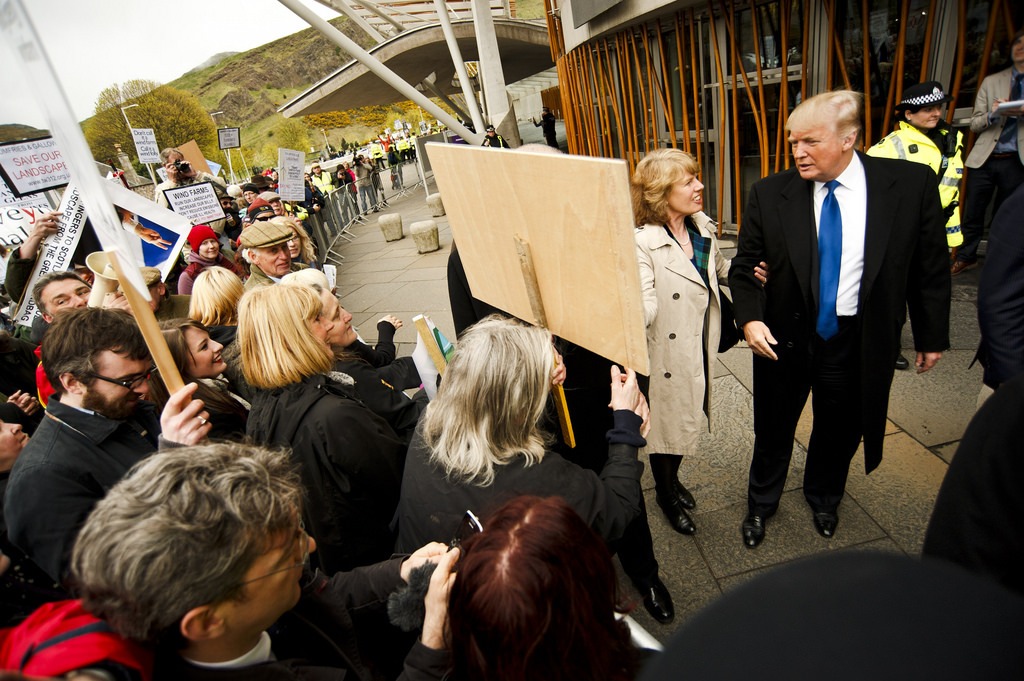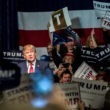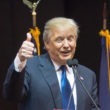Trump in Scotland in 2012. Photo Credit: Friends of the Earth Scotland/Maverick Photo Agency
“You have here, Gentlemen, said the Earl, two of the noblest objects that can entertain the eye, the finest river, and the greatest city in the world,” begins Scottish politician Andrew Fletcher’s 1703 Account of a Conversation, a fictional dialogue set in a Whitehall room overlooking the River Thames in London. “Where natural things are in the greatest perfection, they never fail to produce most wonderful effects. This most gentle and navigable river, with the excellent genius and industrious inclination of the English people, have raised this glorious city to such a height, that if all things be rightly considered, we shall find it very far to surpass any other.”
Fletcher, a notorious opponent of a union between Scotland and England, wrote in a superlative tone that may sound familiar. “I have — as you know, I own Dunebeg in Ireland, which is a phenomenal hotel,” presumptive Republican presidential nominee Donald Trump told reporters in a bizarre press conference at his Turnberry Golf Resort on June 24, the day after the Brexit vote. “It’s one of the most beautiful hotels. It’s one of the most highly rated hotels in all of Europe and it’s got a golf course on this large, five—almost 500-acre parcel of land, on the Atlantic Ocean, and does great.” His visit to Scotland was the most visible merger of the myopic political movements rattling the United Kingdom and the United States, a hardly coincidental blending of worlds that will only be topped by UKIP leader Nigel Farage’s scheduled appearance at the upcoming Republican National Convention.
If Scots didn’t want their border back before the vote, they certainly do now.
Fletcher’s Account was a rare investigation into whether it could indeed be possible for the Scots and English to come together in a truly equal, confederal union, a possibility that Fletcher spent his career fiercely advocating against. London was terminally ridden with corruption, Fletcher’s fictional interlocutors lamented, regretting that “where great Power, Riches and Numbers of men are brought together, they . . . betray all good Government, and bring ruin and desolation upon a People.” Fletcher, like Trump, feared the licentiousness of the capital was sapping his country’s strength and so he put forward a fantastical populist agenda in response. In the Account, he proposed the breakup of Europe into 10 fortified city-states, relegating London to “merely a capital of the neighboring counties” in order to free Scotland from its influence. England’s recent vote to leave the European Union promises to accomplish exactly that.
Fletcher retired from politics after Scotland and England were formally bound in 1707, but not before he led his country on a disastrous imperial mission to found a colony in Panama. He hoped that the colony would help establish Scotland as a trading partner, giving it some leverage with which to resist English rule. Instead, the expedition threw Scotland into ruin, destroying its currency and paving the way for the 1707 Act of Union.
Fletcher’s last words were “Lord have mercy on my poor country that is so barbarously oppressed.” He would have been delighted by the remarks that Trump made in his country just after the United Kingdom voted to leave the European Union, cheering on the dissolution of a utopian political project 60 years in the making and threatening to dissolve the union against which Fletcher so loudly protested—even if Trump did seem to misunderstand Scotland’s position on the matter. As he stood triumphantly beside the cliffs of Turnberry Bay after the referendum results were announced, Trump may have appeared, to generous bystanders, a far less eloquent second coming of the politically challenged Scottish patriot, who also railed against London’s corrupting cosmopolitanism.
“I love the people of Scotland,” Trump said. “That’s why I built, you know I built in Aberdeen one of the great golf courses of the world. It was just adjudged to be the greatest course ever built new.”
Everything is new, glorious, and great in the world of Trump, which is dominated by talk of walls and guards. Like Fletcher, Trump loves “to see people take their country back.” He loves to see borders, and he thinks Scotland should get one. When a reporter asked whether he thinks Scotland should leave the U.K., Trump answered in the affirmative, explaining, “People want to take their country back. They want to have independence, in a sense, and you see it with Europe, all over Europe. You’re going to have more than just—in my opinion, more than what happened last night, you’re going to have, I think, many other cases where they want to take their borders back, they want to take their monetary back, they want to take a lot of things back.” If Scots didn’t want their border back before the vote, they certainly do now.
Fascism at least had the virtue of ideological coherence, some argue. But that gives fascists more credit than they deserve.
Trump’s message, like Fletcher’s, is that people want to take the country back from the crooked influencers of the city. The vacuous language in which he expresses this view has generated a new genre of literature that investigates whether Trump is a fascist, and if so, whether he is more like Hitler or Mussolini. “He even looks like Mussolini in the way he sticks his lower jaw out, and also the bluster, the skill at sensing the mood of the crowd, the skillful use of media,” Robert Paxton, a historian of fascism, told Slate. (Mussolini’s bluster is alive and well in Europe, where his granddaughter, Alessandra, is a member of the European Parliament “elected in part by virtue of her name”).
Fascism at least had the virtue of ideological coherence, some argue. But that gives fascists more credit than they deserve. “Fascist leaders made no secret of having no program,” Paxton writes in The Art of Fascism, pointing toward a strident claim that Alessandra’s grandfather made in response to a critic: “The democrats of Il Mondo want to know our program? It is to break the bones of the democrats of Il Mondo. And the sooner the better.” Fascism was whatever fascists made it out to be.
As the Republican convention in Cleveland nears, we cannot yet know whether Trump will join their number, but we do know that even while he claims to be omniscient (“I saw this happening. I could read what was happening,” he said in Scotland) he doesn’t care for historical analogies, or, for that matter, for history of any kind. He claims to have the world’s best memory, but doesn’t remember making that claim. He is a walking embodiment of our own age of forgetting, goaded on by a media landscape that makes news a tool of mass forgetting, to paraphrase the philosopher Zygmunt Bauman.
“I have never liked the media term ‘mass deportation’—but we must enforce the laws of the land!” Trump recently tweeted. He is able to make these claims in part because the number of people unfamiliar with the term seems to be growing; we are fast approaching a much-anticipated and oft-feared threshold of memory, the time when there will be no more living survivors to remind us of what fascism and its mass deportations actually looked like. This is a man who cites Brooklyn (where his father, Frederick Trump, kept an office all his life), Oakland, and Ferguson as the most dangerous cities in the world and we are to infer that these are the places from which his mass deportations would take place. Trump may be a man of the city—his business runs on the licentiousness, greed, and corruption that Fletcher ardently decried—but he has disowned it.
No one called Fletcher a fascist, nor was he one—he was well regarded in his time, praised by the likes of Thomas Jefferson. Today, U.K. politicians on both sides of the Brexit debate are routinely addressed as fascists; the far left warns that England will turn into a “rainy, fascist island,” and the far right fears the same. Both have courted the idea of disregarding democracy. The young cosmopolites of London feel betrayed by their poorer grandparents to the north who voted to leave the European Union by a wide margin. They’ve spent the weeks since the vote organizing “London stays” picnics and signing petitions to toss out the referendum results, an approach that will hardly endear their movement to the rest of the country. Theresa May will have to address the messy state of U.K. affairs on Wednesday, her first day as prime minister.
In 1703, Fletcher warned of the polarization between London and the rest of England: “That London should draw the riches and government of the three kingdoms to the south-east corner of this island,” he writes, “is in some degree as unnatural, as for one city to possess the riches and government of the world.” Today, there are echoes of his argument in the “Leave” campaign as well as in the U.S. election, where Trump’s derision of his own country’s cosmopolitan centers has found immense currency. And the anti-democratic impulses that Brexit has unveiled on both sides casts a worrying shadow on the U.S. election, which is already rife with discussion of how our representative officials (elected and otherwise) may take it upon themselves to overthrow the will of the people.
Trump revels in all this uncertainty—he doesn’t seem to care what it would mean for anyone else. Asked who his foreign policy advisers are, he replied, “I’m speaking with myself, number one, because I have a very good brain and I’ve said a lot of things.” His latest joke is that if elected, he may not accept the presidency after all. Perhaps this election season has taught him a sinister lesson—that one need not go to the inconvenient length of holding office to develop one’s own strain of fascism.
Linda Kinstler is a Marshall Scholar at the University of Cambridge and contributing writer at Politico Europe.







0 Comments